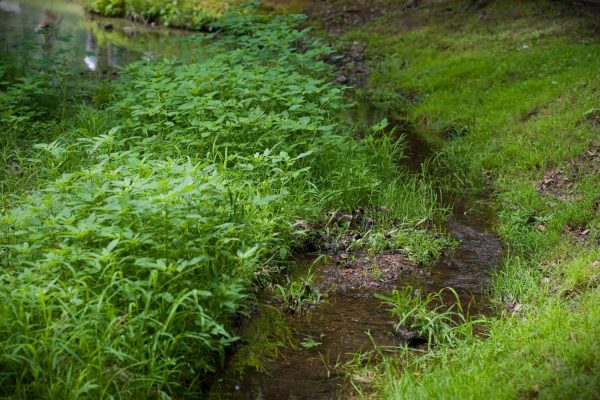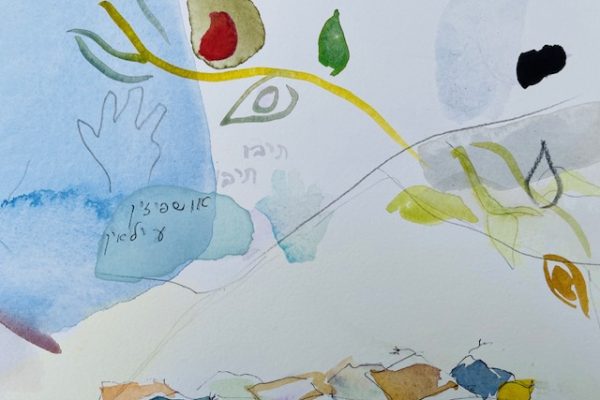This seder is held on the 7th night of Sukkot. All participating guests are called into the kitchen, dining room, community or common room (if using a larger space). The host welcomes everyone and passes out ritual cards with the seder readings on them. Asking all guests to put their hand on a plate or a dish, (s)he/ze invites an individual guest to volunteer to read:
O G-d and G-d of our ancestors, remind us to extend our family to the places where individuals dwell together and alone, to make our passage in the Book of Life a meaningful one through the kinship of _____________________________________________ (the reader can choose to list all the people present and how they relate to each other or read on the following) friends, roommates, colleagues, step-parents, aunts, uncles, gentiles, and all those who dwell with us today.
The host then reads:
We are a chosen people whose ancestors went forth to a distant land. Though scattered, we commit to being a choosing people that readily welcomes all others into our midst.
It is written that “all Israel is responsible for one another” and it is true that we are as responsible for everyone else. So tonight we say: “kol yisrael arevim ze la’zeh…v’kol ha’olam.”
Another guest is invited to read:
Tonight, may we create an expansive Jewish family, a place where everyone here and in the whole world has a place at our table.
The host asks the guests if it is desirable for them to experience the seder outside in or in close proximity to the sukkah. If so, (s)he/ze asks guests to say the following in unison and then to gather outside inside or near the sukkah:
As we leave the shelter of our permanent dwellings on this last day of Sukkot, let us create a new place of gathering rooted in each of us. And let us say: Amen.
If it is not desirable for guests to experience the seder outdoors, the host asks guests to say the following in unison:
We pause before we begin our evening together, to imagine the home we are making in this moment, today. As we leave the shelter of our own homes on this last day of Sukkot, we enter this new one with eagerness to know the people around this table and to fulfill the promise of sukkat shalom, to being a shelter of peace to all who dwell here. With welcome and with care, we greet the people seated next to us and together we say: Amen.
Guests seat themselves around a table (either indoors or inside the sukkah or on picnic blankets nearby if space permits). Another guest is invited to read:
The book of the Zohar teaches that human action can sway the cosmos, that through acts of ethical responsibility, human beings can unleash G-d’s light into the world.
Close your eyes for a moment and imagine the biblical declaration that we are all made in G-d’s image. (Pause)
Apprehending this power, this divine gift, look at your life.
In the day-to-day, how do you act in divine image? How do you honor it? How do you tarnish it?
What is a light of yours that you bring into the world?
The host invites people to open their eyes and share their responses, repeating each question, one moment at a time. After people share their responses, another guest is invited to read:
We not only bring the lantern of our own lights this evening but the combined lights of our ancestors, both dead and living. Ancestors are people of our choosing who call us to be the best of ourselves, who tend to us so we may use our life force for good in the world. (In lieu of the empty seat for the Prophet Elijah, guests summon verbal remembrance of their ancestors.) If you would like, recite the name of an ancestor you would like to invite to be with us here today.
Emboldened by the light of our actions and the light brought forth from ourselves, we choose to bring our radiance to the community we have created here today. For in knowing where we have come from and our choosing lies the secret of our repair and, indeed, our redemption.
The host teaches excerpts of “Turn the World Around” by Harry Belafonte, by asking people to insert where they come from and then getting the group to sing the verses with these diverse places in mind. The host encourages people to make music with their plates, cutlery, and glasses and to sing a joyous rendition of the song. Sukkot, as (s)he/ze explains, places a premium on experiencing joy no matter what, and as we experience the fruits of our harvest, we celebrate the wide circle of our lives, full-force.
We come from the fire
Livin‘ in the fire
Go back to the fire
Turn the world around
We come from the mountain
Livin‘ on the mountain
Go back to the mountain
Turn the world around
Do you know who I am
Do I know who you are
See we one another clearly
Do we know who we are
We come from the __________ (insert place you come from: geographic, emotional, or otherwise)
Livin‘ in the ____________ (repeat place you come from: geographic, emotional, or otherwise)
Go back to the _________(repeat place you come from: geographic, emotional, or otherwise)
Turn the world around
The host asks a guest to read the blessings over bread and wine:
Barukh atah Adonai Eloheinu Melekh ha’olam, borei pri hagafen.
Barukh atah Adonai Eloheinu Melekh ha’olam, Hamotzi lekhem min ha’aretz.
Blessed are you, G-d of our ancestors, who hallows where we have come from, where we are going, and the blessing of eating together today. Amen.
Meal is served. After the meal is served, a guest is called on to recite the following:
On the holiday of Sukkot, we take joy in the harvest and reap the benefit of the seeds we sowed. We create makeshift homes to remind us of G-d’s sheltering presence, and we open our tangible homes to guests from all walks of community life.
But on this night, we prepare for the moment of inevitable hibernation that follows our moment of plenty. The return back to our individual homes. A new holiday marking that necessary unfruitfulness that enables the earth and its creatures to rest and renew.
Holding together the winter and springtime allows us to re-examine the larger meaning of our lives, the relationships we have tended to, the ones we have left to wither and fade. As we retreat a bit from community, we turn the focus to our individual selves. Take a moment with the person next to you and recall your relations. Describe the relationships you have tended to. The ones you have let wither and fade. Go inward and remember the light you spoke of this evening. Your light. Your candle to the world. How will you use your light to re-kindle and repair? Take a moment to share between you.
The host invites the group:
Taking a candle, light the wick of the person next to you, and as you do, share what you learned about the gift of their light and their contribution to others.
The ritual continues until all the candles are lit. The host continues:
Tonight, we take up our lights for the sake of the whole world. Together, we speak:
All of us, though broken, are fundamentally, celestially whole.
The host says:
I ask for a volunteer now to collect your drinking glasses. We began this evening with the teaching that humans can be G-d’s light. Keeping with the ancient tradition of our people and the cyclical rhythm of this season, we realize that we must unmake to begin again. Here tonight, we acknowledge our darkness and our light and the sweetness in all our struggles. With the breaking of our glasses, we confront our personal demons and mark the triumph of our resilient spirits.
Calling on ancestors of our choosing, we utter any part of the following that speaks to us and our healing. We pray:
May our families be varied and rich as the stars.
May we meet our estrangement with reunion (Meditate on Jacob, Esau, or an ancestor of your choosing).
May we never conflate heredity with hospitality (Meditate on Sarah, Hagar, or an ancestor of your choosing).
May we uphold the virtue of speaking up and being the best of who we are (Meditate on Vashti, Ahasuerus, or an ancestor of your choosing).
May we listen to voices of responsibility and reason (Meditate on Judah, Joseph, or an ancestor of your choosing).
May we find friendship outside our birth families (Meditate on Jonathon, David, or an ancestor of your choosing).
And solace and belonging inside our chosen ones (Meditate on Ruth and Naomi, or an ancestor of your choosing).
And above all, may we be precious lights to one another and recognize and find cause to rekindle our remarkable humanity (Meditate on Moses, Aaron, or an ancestor of your choosing).
The host asks a guest to break the glasses against the north wall of the house. With the sound of the broken glass, the seder is adjouned. The host closes:
May you and your family be a blessing and go in peace.











